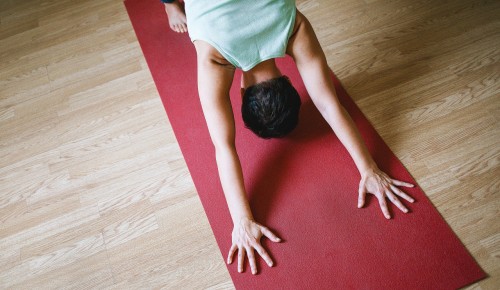Yoga is not a work-out, it is a work-in. And this is the point of spiritual practice; to make us teachable; to open up our hearts and focus our awareness so that we can know what we already know and be who we already are.
~~ Rolf Gates ~~

According to Psychology Today, yoga has numerous benefits, both for our physical and mental health. A study published in the International Journal of Yoga suggested that practicing yoga enhances muscle strength and body flexibility, improves cardiovascular and respiratory function, reduces stress, depression and chronic pain, meliorates sleep patterns and promotes recovery from injuries and treatment of addiction.
There are many other ways yoga can be helpful for recovery from an illness or for better coping with some physical issue.
Yoga and Therapy
Two studies, published in the Journal of Clinical Oncology have confirmed some benefits of yoga by observing women with breast cancer. Namely, according to the first one, yoga helped women undergoing radiation therapy to reduce fatigue, regulate stress and improve mental outlook. The second one has, on the other hand, observed women who have just completed cancer treatment to increase energy, reduce inflammation and improve mood and vitality. Though these studies included small specific groups, researchers believe that these health benefits are applicable to the broad population.

Yoga as Prep for Surgery
Any surgery, no matter how small and routine it can be, is really stressful. The very idea of having someone approaching your body with the clear intention of opening it and “peaking” inside can produce anxiety and tension. If you have the luxury of enough time to prepare your mind and body for surgery, instead of being rushed to a hospital, you should use yoga to enhance your immunity and induce a sense of calm, which can help your body heal faster. One of the most relaxing techniques is Yoga Nidra which is a process of progressive muscle relaxation, meaning that it releases tension from your body.

Yoga in Recovery Period
Recovery after any surgery can be challenging and impact the integrity of your body. Yoga can be useful in that crucial period, but in some cases and with some techniques it can be rather dangerous. So, before you decide to engage in such activities you will have to clear with your surgeon what you should and should not do in the recovery period. Ask about specific activities, techniques and if there is a need for using some medical supplies to ensure that you are safe during the workout.
Healing and Preventing Sports Injuries
Yoga can not only help you recover from some injury, but it can also help you prevent some injury from even happening. Because it requires every body part to be engaged, it can easily recover all the blind spots you have developed during years of training. Maintaining yoga poses for several minutes can have a positive effect on sore, tight and inflamed tissues, muscles, joints and fascia that appear in sportsmen, especially runners. Restorative yoga can work as balanced counterpoint to high-impact endurance training. Yoga can work as muscle injury remedy by relaxing certain natural reflexes which are automatically contracting the muscles.

Yoga for High Blood Pressure
According to a study published in BioMed Central, yoga can help lower high blood pressure. Namely, researchers came to conclusion that short yoga sessions practiced at home have a positive effect on self-observed quality of life and on hypertension issues. This means that some specific yoga practices can be used as supplementary hypertension therapy in addition to regular medical treatment prescribed by doctors.
The Answer: Yoga and Medicine
The solution is not in renouncing the conventional medicine. There is no denying that some problems can be solved only with the expert hands of a surgeon. That, again, does not mean that you should rely specifically on medicine to solve all your problems, either. The key is using them both to your advantage. To be healthy, you have to fully understand your body, both from the eastern and western medicine perspective.

The use of yoga alongside conventional medical and psychiatric treatments for a wide range of physical and mental conditions has become rather common today. The alternative therapies which are used with medical practices, such as herbal medicine, massage, acupuncture and yoga, are called “complementary therapies”. According to a study published in the International Journal of Health Sciences, these therapies, though efficient in some cases, should not be taken as a sole solution for more serious illnesses.
Yoga, as a holistic discipline which impacts our bodies and minds, can only be helpful in dealing with health issues. However, it is important to practice it in a way that will not worsen your condition and consult a doctor to understand the boundaries you should not cross.








